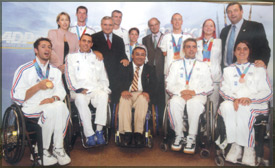|
DAILY NEWS ONLINE |
|
|
|
OTHER EDITIONS |
|
|
|
|
|
|
|
|
|
OTHER LINKS |
|
|
|
|
|
|
 |
Giving the disabled the opportunity to liveA recently-passed law in France aims to guarantee disabled people with equal rights in the areas of health, housing, education, employment and training while providing them with the resources necessary to live everyday life to the full and pursue their life plans.
On February 11, 2005, France announced the approval of legislation promoting 'equal rights and opportunities, participation and citizenship for people with disabilities'. This new law sees the conclusion of plans to reform existing legislation, initially addressed by President Jacques Chirac in July 2002 as one of three priority issues set for his second five-year term of office. Defended by Marie-Anne Montchamp, Secretary of State for the Disabled, it also represents the most important legislative project in the area of disability in France since the laws passed in 1975 and 1987. The ambitious new bill endeavour to improve the lives of some 5.5 million disabled people across France. President Chirac described it as an opportunity 'to make disabilities - which are part of life's realities - acknowledged by all people in society'. In the same spirit, Marie-Anne Montchamp is pleased to have initiated a 'genuine social debate', and for good reason: the new legislation, adopted after the bill's second reading and much lively parliamentary discussion, heralds a radical change in the governmental mindset. For the first time, disability will be included in France's Code for Social action, while multi-disabilities and physical and cognitive disabilities, such as autism, will at last gain legal recognition. The President also described as a major step forward - 'undoubtedly unparalleled since the Liberation' - the creation of a new social security branch for the disabled, in the same vein as health insurance and pension funds. The future Caisse Nationale de Solidarite' pour l'Autonomie (France's National Independent Living Support Fund) will be allocated a budget of 850 million euros and 'offer budget transparency and guarantee equal treatment across the country' promises Marie-Anne Montchamp. In addition, following the shift from a uniform and anonymous benefits system to a policy based on law and social protection for disabled people, notably thanks to the creation of a compensation scheme, the law signals a fundamental change in the current way of thinking. The government is sending out a strong message that - in a society where performance is key - is certain to alter the way in which people with disabilities are viewed. The new law comprises seven chapters, the most revolutionary of which establishes compensation for all people with disabilities, irrespective of age, lifestyle, and the source or nature of their deficiency. To improve living conditions for the disabled, the national support fund plans to implement, by January 1, 2006 at the latest, a new allowance targeting people who face loss of independence. It will be extended to children within the next three years. The scheme has been granted a 550-million euro budget for technical assistance, such as equipping one's home, purchasing a vehicle, and paying for caregivers (to assist disabled people on a daily basis) or trained service animals. The amount of this 'universal' benefit will be assessed according to the disabled person's 'life plan', defined in conjunction with those concerned at new disability centres - another innovation ushered in by the new law. The aim of the disability centres, slated to open in every French department from January 2006, is clear: to offer disabled people and their families a "one-stop shop" where they can obtain practical information on their rights and guidance in their administrative procedures. Additionally, the legislation sets forth a guaranteed income for people with disabilities who work, as well as those who are unable to work or who live in institutions such as hospitals, socio-medical establishments and prisons. Improving the daily lives of people with disabilities also implies making buildings and transport more accessible. The scale of investment required to enable people with disabilities to go shopping, use public services, visit cinemas and museums, and take advantage of the activities offered by art and cultural centres has provoked much debate among members of parliament. The result: a 10-year maximum time-frame for making all public transport, residential buildings and public places accessible to the disabled. At last, France is poised to catch up with its European neighbours. Equal opportunities in education are a further consideration of the law, which aims to promote the integration of disabled children into schools. As of September 2005, disabled children will be enrolled in local schools. Under the terms of the new law, families will have the right to oppose this decision. This is 'plain common sense', according to the Secretary of State, 'since parents are in the best position to know what's right for their child'. As for recruitment and employment, the law passed on 11 February goes beyond simply reaffirming non-discrimination and equal treatment in the workplace by stepping up financial penalties against companies who fail to meet the hiring quota for people with disabilities. Last but not least, in the area of training, research, prevention and access to healthcare, a national monitoring unit is planned, and health and socio-medical professionals are all set to receive disability training. The Law of February 11 is far more than a step forward: it is major enterprise for French society as a whole. Official website of France's Secretary of State for the disabled: www.handicap.gouv.fr (Actualite En France) |
|
|
|

